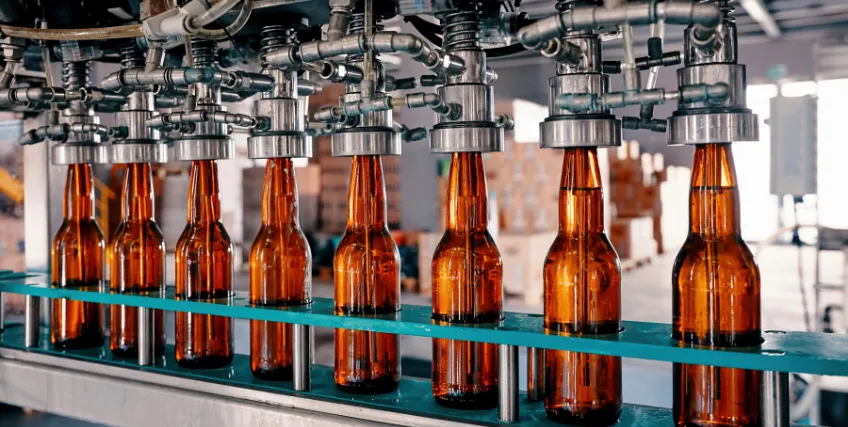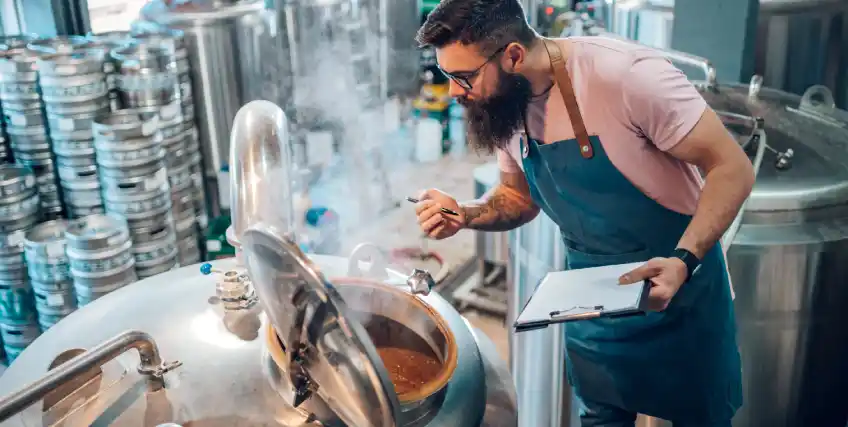Brewery Business Financing: Tips for Managing Costs and Cash Flow
Sep 11, 2025 | Last Updated on: Sep 15, 2025

The craft beer industry is a nearly-$30 billion industry and growing everyday, but behind the taps and tanks lies a constant challenge for craft brewers: managing the costs involved with operations while maintaining a healthy cash flow. Whether you're launching a new brewery or scaling an established brand, the financial demands are significant, so strategic planning is key.
From production equipment and licensing to staffing, distribution, and marketing, brewery expenses can add up quickly. Well-structured financing isn't just about growth for business owners, either — it's about keeping your brewery stable and ready for whatever comes up next.
Here's a look at how funding like brewery equipment financing can support your business's cash flow, reduce upfront costs for a startup brewery, and set you up for long-term success.
Why Brewery Financing Matters for Cash Flow
Breweries are capital-intensive businesses. Simply outfitting a brewhouse with brewing equipment like fermentation tanks, brew kettles, boilers, filtration systems, and canning lines can easily cost you hundreds of thousands of dollars. And that's before factoring in the costs of real estate, raw materials, staffing, licensing, and regulatory compliance.
Attempting to pay for all of this upfront in cash can quickly drain your working capital, if you even have that kind of money available. At best, this leaves little room for any emergencies that come up. You could also find yourself in a tough spot during slow seasons or if new opportunities arise.
This is where brewery equipment financing comes into play. By spreading your equipment costs out over time, you can keep your operating capital intact and even meet all of your financing needs without compromising.
In addition to taking out equipment loans to stock up their new business, breweries often rely on specialized craft brewery loans for operational support, business expansion, and as a source of short-term working capital. When used properly, these small business loans can turn big, fixed costs into manageable monthly expenses and give owners the flexibility to invest in their brand without overextending.
Financing Brewery Equipment and More
Brewery owners often find themselves facing a complex financial situation. These businesses have high upfront costs, seasonal revenue cycles, and a constant need for reinvestment in equipment, people, and production. So, the funding needs never really end.
Fortunately, there are many different business financing options designed to support not just equipment purchases, but also overall cash flow and sustainable growth. Choosing the right mix of financing tools can help you control your brewery costs, protect working capital, and position yourself for a successful brewery venture.
Brewery Equipment Loans
One of the most common financing tools in this industry is a brewery equipment loan. These loans provide borrowers with a lump sum upfront that can be used to purchase necessary brewing equipment. You'll repay the loan over a fixed term, often ranging from two to seven years, and usually at a fixed interest rate.
The biggest advantage of brewery equipment financing is that it lets you buy high-value assets without coughing up all of that cash upfront. Most of these loans are secured by the equipment itself, which can not only improve your chances of approval but may also bring a lower interest rate.
Equipment Leasing
Equipment leasing can mean greater flexibility than traditional loans, especially for breweries that expect to grow rapidly or upgrade their technology and equipment regularly. Leasing lets you test out and use important brewing and packaging equipment without the burden of ownership, and usually with lower upfront costs.
Leases can sometimes even be structured to include equipment maintenance, upgrades, and buyout options at the end of the lease term. This makes them particularly enticing for early-stage breweries or those with variable production demands. While you won't build equity in the equipment with a lease, leasing can help you preserve your working capital and simplify your budget. It also lets you test out new brewing technologies before committing to long-term purchases.
SBA Loans
Loans backed by the Small Business Administration (SBA) can be a very powerful craft brewery financing option to entrepreneurs who qualify. Whether you're opening a new taproom, expanding distribution, or hiring key staff, the funds from an SBA loan can provide you with the necessary capital for brewery equipment financing and beyond.
The SBA 7(a) and 504 loan programs in particular offer long repayment terms, competitive interest rates, and borrowing limits up to $5 million. Because these loans are guaranteed by the SBA, the lender's risk is reduced. In addition to equipment purchases, SBA loans can be used for working capital, real estate purchases, debt refinancing, and more.
The SBA loan application process is more detailed and time-consuming than a typical business loan, so it's not the best option for business owners who need cash fast. If you're planning major investments and have some lead time, though, writing a strong business plan, gathering financial statements, and submitting an application through an SBA lender could be worth the effort, especially if you have a strong credit score and payment history.
Business Lines of Credit
Similar to a credit card, a business line of credit is an on-demand, revolving form of debt that can be used to cover short-term needs such as payroll, supplies, or emergency repairs. With a line of credit, you're approved for a maximum borrowing amount that you can tap as needed in the future.
You'll only pay interest on the funds you withdraw with a line of credit, and your credit limit renews as you pay down the balance. This makes it a valuable supplement to other brewery equipment financing, as it's a safety net that helps you respond quickly to unexpected expenses without disrupting daily operations.
Working Capital Loans
If you need quick cash to cover short-term costs like inventory, raw materials, or marketing expenses, a working capital loan may be the right fit. These loans are typically smaller and shorter in duration than brewery equipment financing, but they're faster to secure and can help maintain operations if your cash stores fall short. Working capital loans are also a good option for breweries with seasonal revenue swings or that operate in fast-changing markets.
Brewery Equipment Financing for Cost Control
Investing in equipment is essential for your brewery's success and growth, but it's also a significant and ongoing cost. But with the right brewery equipment financing strategy, you can control those costs and plan repayments around your revenue cycle.
Brewery equipment financing helps you to conserve cash while buying the tools you need to improve efficiency and output. Whether it's an upgraded canning line, keg washers, or fancy canning and labeling machines, financed equipment can often pay for itself over time by boosting production and reducing manual labor.
Brewery equipment financing lets you budget better with fixed monthly payments.
Choosing the Right Financing Strategy for Your Brewery Business
Choosing the right brewery equipment financing option hinges on more than just interest rates. You'll also need to consider how each option aligns with your production goals, revenue streams, and risk tolerance, in addition to what you can qualify for.
A long-term brewery equipment loan might make sense if you're planning to own and operate your equipment for many years. Leasing might be more appropriate if you expect your production needs to evolve rapidly or if you want to upgrade technology often.
If you're expanding a facility, opening a taproom, or increasing distribution, craft brewery financing through SBA or private lenders may offer the most flexibility. And for cash flow support, a revolving line of credit can keep your operations moving even when revenue is uneven or unexpected costs arise.
Final Thoughts
Securing financing for your brewery isn't just about buying equipment or funding expansion. It's a strategic way to manage your costs, improve your cash flow, and build a more resilient craft beverage business.
Brewery equipment financing can help you acquire the tools you need to operate efficiently, while brewery loans and lines of credit give you flexibility when cash flow tightens. By choosing the right financing structure and aligning it with your revenue cycle, you can turn debt into a growth asset rather than a liability.
Whether you're an emerging microbrewery or a scaling production facility, understanding your options and how they impact your cash flow is essential. With smart planning and the right lenders, your brewery can thrive in this competitive and ever-evolving market.
FAQs on Brewery Equipment Financing
What types of loans are available for breweries?
Whether buying new or used equipment, brewery owners can tap into a range of financing options, including brewery equipment loans, SBA loans, working capital loans, business lines of credit, and equipment leases. The best borrowing option depends on your brewery's financial goals, size, and current revenue.
Is it better to lease or buy brewery equipment?
Leasing is ideal for breweries that want flexibility, lower upfront costs, and the option to upgrade equipment frequently. Buying with brewery equipment financing is better for long-term ownership and building equity, while leasing lets you test drive equipment before committing to a big purchase. It is important to note that the best will vary.
Can I use financing to fund more than just brewery equipment?
While brewery equipment financing is specifically for equipment purchases, broader brewery loans can support your brewery's expansion, marketing, inventory, hiring, or even opening a new taproom. Lines of credit and SBA loans are especially useful for these purposes.
Are there possible tax benefits with brewery equipment financing?
In many cases, financed equipment may qualify for Section 179 tax deductions, which let you deduct the full purchase price of qualifying equipment that same tax year. Interest payments on a brewery equipment loan may also be deductible; be sure to check with your tax professional to learn more.
Are there lenders who specialize in brewery equipment financing?
Lenders familiar with craft brewery financing understands the industry's seasonal cash flow, production cycles, and equipment needs. They're more likely to offer tailored loan terms and flexible repayment structures that support your specific business model and financing needs.
Frequent searches leading to this page
Related Articles
Understanding Small Business Loans for Breweries: A Guide for Craft Brewers
September 15, 2025
Popular Business Loans for Craft Breweries: Funding Growth Without Diluting Ownership
September 15, 2025
Brewery Business Financing: Tips for Managing Costs and Cash Flow
September 15, 2025
Term Loans are made by Itria Ventures LLC or Cross River Bank, Member FDIC. This is not a deposit product. California residents: Itria Ventures LLC is licensed by the Department of Financial Protection and Innovation. Loans are made or arranged pursuant to California Financing Law License # 60DBO-35839




